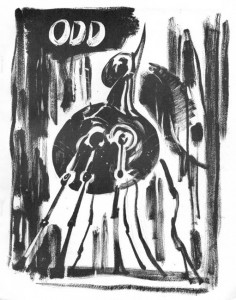I RECENTLY BROUGHT a copy of FANZINES by Teal Triggs (Chronicle Books). Its concept is similar to a book project that I’ve been working on, in a start, stop, start manner, over the last few years. Triggs’ FANZINES is a profusely illustrated short history of fanzines in England and the USA, and a book that I would highly recommend to anyone who can appreciates the DIY spirits of fanzines publishers and editors. FANZINES is a general overview that attempts to cover rock, punk, Star Trek, sci-fi, feminism, politics, and comic book zines. In my own book project I am focusing on presenting the secret history of science fiction as revealed in the thousands of sf fanzines that appeared in the wake of Hugo Gernsback’s first issue of Amazing Stories (1926).
Most zines are the product of youth. I put together my first one when I was 11. (Its subject was horror movies and comic books. The print-run was 3 copies and these were shared with classmates in my homeroom sixth-grade class.) Over the years I have followed and collected many zines, along with newsstand magazines (Cult Magazines: A to Z shows some of my favorites), and I have always been amazed at the level of professional striving in sf zines. Indeed, many young sf zines publishers have grown up to become professional authors and artists and a short list of teenage zine editors would include Robert Silverberg, Harlan Ellison, and Ray Bradbury. Later in life, as professionals, many were sympathetic toward the next generation of sf zines editors who would come up to them at a sf convention begging for some small contribution of copy or art. (Of course, nowadays someone like John Scalzi will just throw up a blog on the web.) This comradeship seems to be a uniquely sf thing. (Yes I know that there are music stars that interact with zines, but this has always struck me as falling under the rubric of pr. Sf pros usually do it as a show of allegiance to the genre.)
Taking into account all of the interaction between sf fans and sf professionals it is easy to see that there is a wealth of social history hidden in science fiction zines. FANZINES has spurred me to renew my efforts on THE INTERPRETATION OF ZINES (the working title of my book).
(Top: cover to ODD fanzine by Jack Gaughan from Othermost: The Art + Life of Jack Gaughan.)

Write a Comment